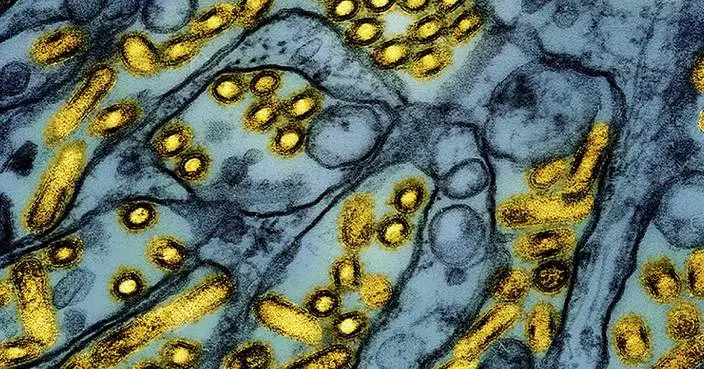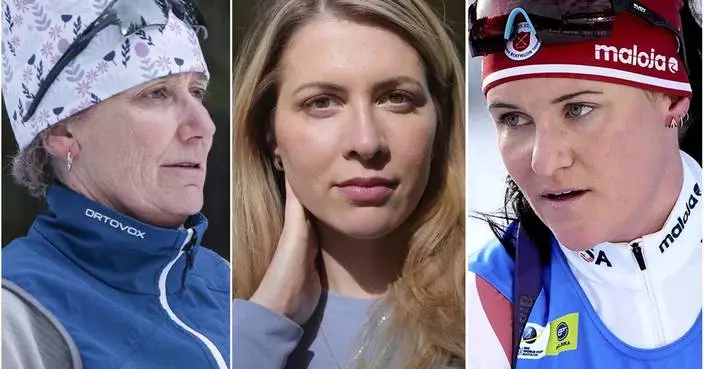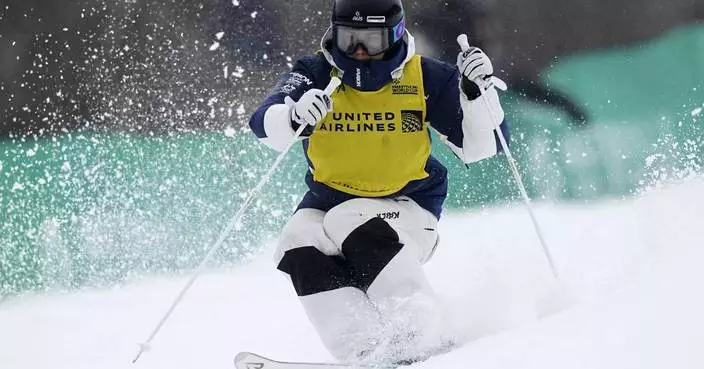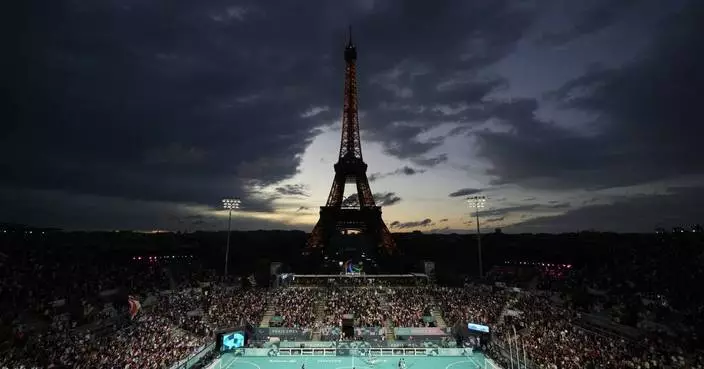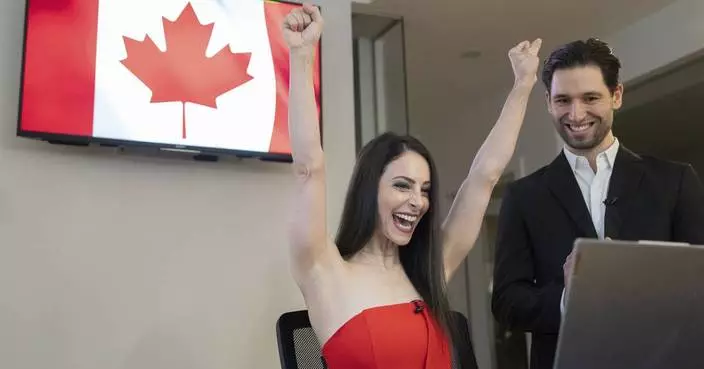They weren't allowed to fly their flag or play their anthem. That didn't mean there were no celebrations for the Russians in Pyeongchang.
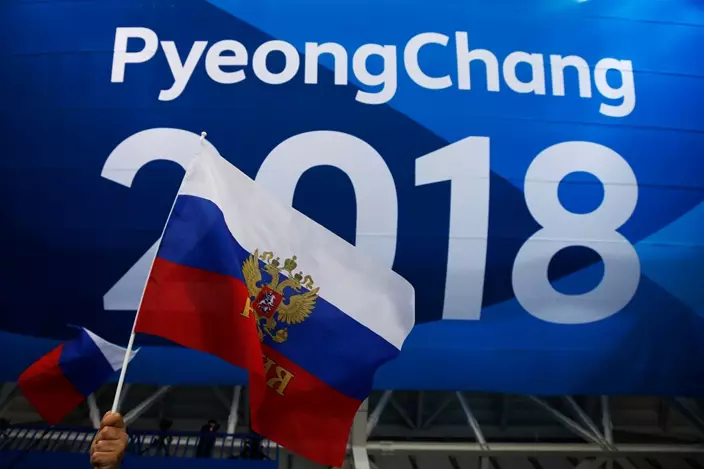
A fan of the Olympic athletes from Russia waves a flag before the men's gold medal hockey game against Germany at the 2018 Winter Olympics, Sunday, Feb. 25, 2018, in Gangneung, South Korea. (AP Photo/Jae C. Hong)
A drought-breaking hockey victory on Sunday and a women's figure skating title provided a prestige boost for a team of athletes who arrived at the Winter Games amid the humiliation of International Olympic Committee sanctions for a doping scheme in Sochi four years earlier.
Click to Gallery
A fan of the Olympic athletes from Russia waves a flag before the men's gold medal hockey game against Germany at the 2018 Winter Olympics, Sunday, Feb. 25, 2018, in Gangneung, South Korea. (AP Photo/Jae C. Hong)
Olympic athletes from Russia celebrate with their coach Oleg Znarok after winning the men's gold medal hockey game against Germany, 4-3, in overtime at the 2018 Winter Olympics, Sunday, Feb. 25, 2018, in Gangneung, South Korea. (AP Photo/Jae C. Hong)
Olympic athlete from Russia Vasily Koshechkin celebrates with fans after winning the men's gold medal hockey game against Germany, 4-3, in overtime at the 2018 Winter Olympics, Sunday, Feb. 25, 2018, in Gangneung, South Korea. (AP Photo/John Locher)
The Olympic, German and Canadian flags are unfurled during the medals ceremony after the men's gold medal hockey game between the Olympic athletes from Russia and Germany at the 2018 Winter Olympics, Sunday, Feb. 25, 2018, in Gangneung, South Korea. Olympic athletes from Russia won 4-3. (AP Photo/Jae C. Hong)
Olympic athletes from Russia celebrate after winning the men's gold medal hockey game against Germany, 4-3, in overtime at the 2018 Winter Olympics, Sunday, Feb. 25, 2018, in Gangneung, South Korea. (AP Photo/Jae C. Hong)
"You know it was only 7 a.m. in Russia when we start play, but I think now everybody's up and they're celebrating. Today will be a holiday in Russia," forward Ilya Kovalchuk said after helping the Russians edge Germany 4-3 in overtime to win the Olympic gold medal.
The "Olympic Athletes from Russia" — the name they were designated as part of the IOC's sanctions — also collected six silver medals and nine bronze.
That ranked the OAR team sixth in terms of total medals but an unfamiliar 13th in terms of gold medals won, the measure for success used by most Russians.
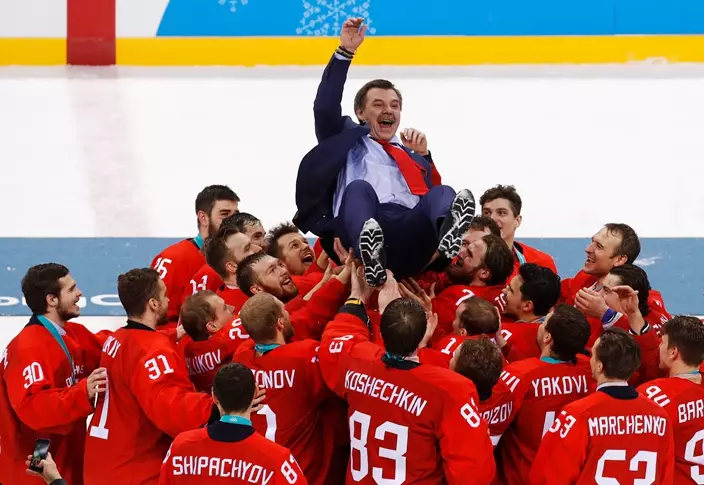
Olympic athletes from Russia celebrate with their coach Oleg Znarok after winning the men's gold medal hockey game against Germany, 4-3, in overtime at the 2018 Winter Olympics, Sunday, Feb. 25, 2018, in Gangneung, South Korea. (AP Photo/Jae C. Hong)
Team Russia won 13 gold at the Winter Games it hosted in Sochi in 2014, but later lost two for doping.
For those watching in Russia, Pyeongchang was an Olympics marked by legal battles rather than sports.
On top of that, they had to wait two weeks for their first gold medal.
The champion of the games for many Russians was the 15-year-old figure skater Alina Zagitova, a graceful competitor with incredible jumping ability, and a powerful symbol of a post-Sochi generation.
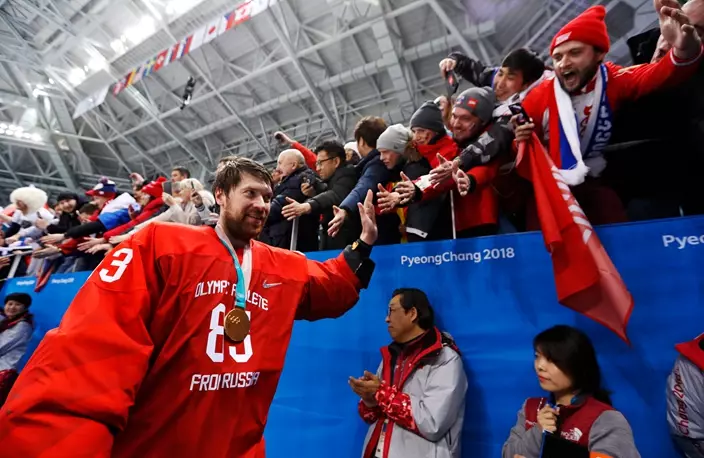
Olympic athlete from Russia Vasily Koshechkin celebrates with fans after winning the men's gold medal hockey game against Germany, 4-3, in overtime at the 2018 Winter Olympics, Sunday, Feb. 25, 2018, in Gangneung, South Korea. (AP Photo/John Locher)
Of the 168 Russians invited to compete in Pyeongchang — the third largest team — most hadn't been in Sochi. That was because of a mix of retirements, doping bans and a vetting process which ruled out dozens of athletes including some gold-medal contenders because an IOC commission said it couldn't be sure they weren't involved in past doping schemes.
The opening ceremony was preceded by legal challenges as 45 Russian athletes appealed against the IOC's refusal to invite them. Hours before the opening ceremony, the Court of Arbitration for Sport ruled in favor of the IOC. At the ceremony, Russia marched in gray coats behind the Olympic flag, which was held by an Olympic volunteer, not an athlete.
Significantly, the first Russian to compete at the Winter Games since the Sochi doping scandals later failed a doping test. After days of denials and allegations of drink-spiking, mixed doubles curler Alexander Krushelnitsky was disqualified and had to surrender his bronze medal, which was later awarded to Norway.
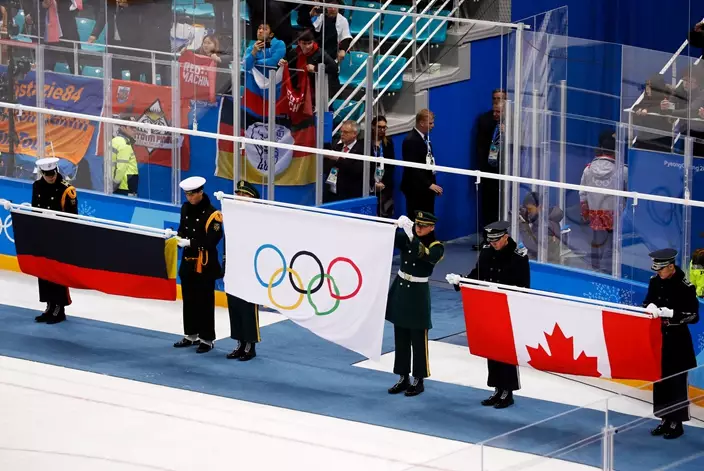
The Olympic, German and Canadian flags are unfurled during the medals ceremony after the men's gold medal hockey game between the Olympic athletes from Russia and Germany at the 2018 Winter Olympics, Sunday, Feb. 25, 2018, in Gangneung, South Korea. Olympic athletes from Russia won 4-3. (AP Photo/Jae C. Hong)
The lawyers were called in again for bobsledder Nadezhda Sergeeva, who accepted a disqualification Saturday after testing positive for a banned heart medication.
The out-of-competition focus overshadowed some surprising medal achievements. A team of young cross-country skiers won three silver and four bronze medals, almost half the Russian total, but attracted scrutiny because four skiers are coached by a man once suspended over doping.
Russia's medal hopes were reduced in part because the Russian Olympic Committee opted not to fill more than 40 open slots with other athletes when its preferred choices didn't pass IOC vetting. That left the Russians unable to compete in relays in sports like biathlon and speedskating because it couldn't field enough athletes.
At the closing ceremony, Russia again marched without its flag, likely for the last time. The IOC had agreed to reinstate Russia if no more drug tests from Pyeongchang come back positive.
Despite the lack of logos and flags, it seemed everyone knew who the "Olympic Athletes from Russia" were.
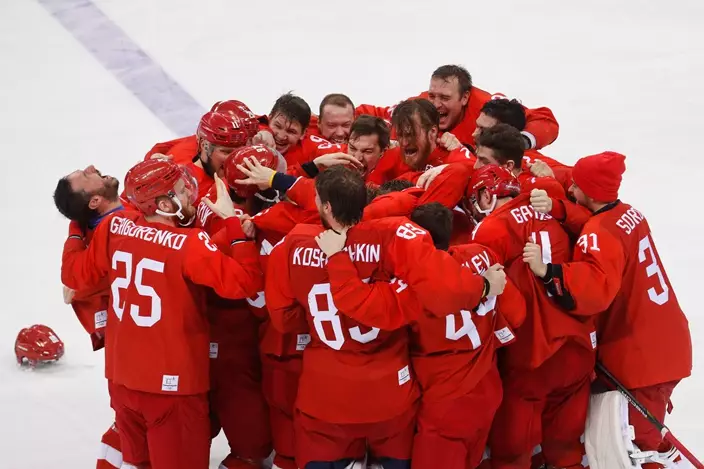
Olympic athletes from Russia celebrate after winning the men's gold medal hockey game against Germany, 4-3, in overtime at the 2018 Winter Olympics, Sunday, Feb. 25, 2018, in Gangneung, South Korea. (AP Photo/Jae C. Hong)
After weeks of chafing under IOC rules that barred them from criticizing the doping sanctions or wearing Team Russia uniforms, the hockey players ended the Olympics on a note of defiance. As the Olympic anthem played for their medal ceremony, the players joined hundreds of spectators in belting out the Russian anthem.
It was "freedom of speech," defenseman Bogdan Kiselevich explained.
"We sang because we are Russian people and when you win, your country's anthem plays," he said. "It was with heart and soul."
LAUSANNE, Switzerland (AP) — Seven International Olympic Committee members are running as candidates to be the next president in its first election since 2013.
Their newly published manifestos show broad consensus on some issues and challenges for the IOC and global sports: Climate change and sustainability, engaging with youth via social and digital media in the fast-changing broadcasting landscape, harnessing AI, protecting women's sport.
There are clear differences in whether to pay prize money to Olympic athletes and how to engage more than 100 members — their voters at a March 18-21 election meeting in Greece — in shaping the IOC's future and picking host cities.
The winner will succeed Thomas Bach, whose executive-style presidency formally ends on Olympic Day, June 23, after a three-month transition period.
The two-time men’s 1,500-meters gold medalist represents the biggest challenge to the Olympic establishment though insists: “This is not a broken movement. It has,” he suggests, “to reset around sport.”
Running track and field’s governing body, Coe has paid prize money to Olympic champions, been tough on doping and promoted fairness in women’s track and field. He promises to “advocate for clear, science-based policies that safeguard the female category.”
He says IOC voters have told him “decision-making is overly centralized” and pledges “rebalancing of the roles and responsibilities,” while giving athletes “meaningful” input in decisions. “I am good at building teams. I don’t micro-manage,” he says, using a label others have put on IOC president Thomas Bach.
At age 68, Coe is nearing the IOC’s retirement age of 70 and would need an exemption to stay in office. He promises to seek re-election after four years – half of the statutory first mandate of eight years. His 22-page document is published only in English.
A 24-page document with much aspirational rhetoric though few details positions her having “deep insight into IOC policies.”
Seen as Bach’s preferred candidate, she pushes for strengthening established IOC policies, like the scholarship program that directs money to athletes and the 206 national Olympic bodies, and empowering the IOC Commissions. They are the panels of members and sports officials closely guided by the 700-strong IOC administration.
The two-time swimming gold medalist and sports minister in Zimbabwe’s government would be the first woman to lead the IOC, aged just 41, and the first African. “My mission to drive empowerment, strengthen engagement, and ensure we remain relevant, is guided by the Ubuntu philosophy: ‘I am because we are.’”
An IOC member only since July, Eliasch cites his decades of leadership experience in sports, business — owning the tennis and ski brand Head — politics and philanthropy. His stated business philosophy is “1+1=3” and encouraging all members to submit ideas. This is “no time for a novice,” he writes, and believes Bach’s “exemplary” leadership of the IOC on geopolitical issues were worthy of a Nobel Peace Prize.
Eliasch opposes the IOC paying prize money to athletes, wants it to shape gender policy “ensuring that only those who were born female can compete in women’s sport,” and promote more “star-powered entertainment” features throughout the Olympic Games not just at opening and closing ceremonies.
A long-time environmentalist, Eliasch proposes rotating the Winter Games among a group of permanent venues, and conserving a rain forest area of the exact size of each Olympic host city.
The younger brother of Jordan’s King Abdullah II cites 35 years of military service and work in “nation-building, security and diplomacy” in a 20-page document. He would give IOC members more “voice and a vote” in IOC business and add five more years to their retirement age, setting the limit at 75.
Prince Feisal suggests athletes should be “properly valued,” a hint at paying prize money, and advocates moving the Summer Games out of July and August, due to climate change and to let more cities bid to host. He proposes regional offices for the IOC, which has about 700 staff in Lausanne, Switzerland.
In less than three years as an IOC member, Lappartient has led a winning Winter Games host bid, for 2030 in the French Alps, and oversaw a 12-year deal with Saudi Arabia to create the Esports Olympic Games. Both projects had Bach’s blessing.
Still, Lappartient would review the system he has thrived in. He also would empower IOC members and suggests their annual meetings should be a debating forum “not just a place where people go to listen to reports.” Seeking to improve efficiency, he would cut the number of committees and how many sit on them.
He suggests having more athlete members – now capped at 15 out of a maximum 115 — and make the IOC Ethics Commission “fully independent in its operations.” Currently it reports to the Bach-chaired executive board. His fast-track candidacy aims to take the Olympics to Africa, find “a balance between the continents for future hosts” and create high performance centers for athletes in each continent. He opposes the IOC paying prize money.
A 42-page manifesto is the longest and most specific on policy proposals.
The banker and son of long-time former IOC president Juan Antonio Samaranch cites his “proven experience in sport and business, both inside and outside the Olympic Movement.” An IOC member for 23 years, he wants more debate “not presentations with predetermined outcomes,” giving members choices again to pick Olympic host cities, and more flexibility to schedule the Summer Games.
Samaranch would relax broadcast rules to let Olympic athletes use footage of their games performances on social media and be global influencers. He suggests opening new tiers of commercial sponsors, creating a donor program to raise $1 billion within five years for Olympic non-profit foundations, and let other sports hire the Olympic broadcasting operation.
The shortest document at just five pages has clear big ideas, from an expected outsider in the contest.
The key is staging the Olympic Games in all five continents — one city and 10 sports in each — in a 24-hour rolling broadcast. This would add more sports and allow more and smaller cities to be Olympic hosts more sustainably. Also to restructure the IOC as a House and Senate, with a lower chamber of the 206 NOCs and sports governing bodies and a decision-making upper chamber of up to 120 IOC members. The president would have three terms of four years instead of an eight and then four.
Watanabe wants the IOC to focus on business projects for mental health and wellness, and notes his father was exposed to the atomic bomb in Hiroshima.
AP Olympics: https://apnews.com/hub/2024-paris-olympic-games
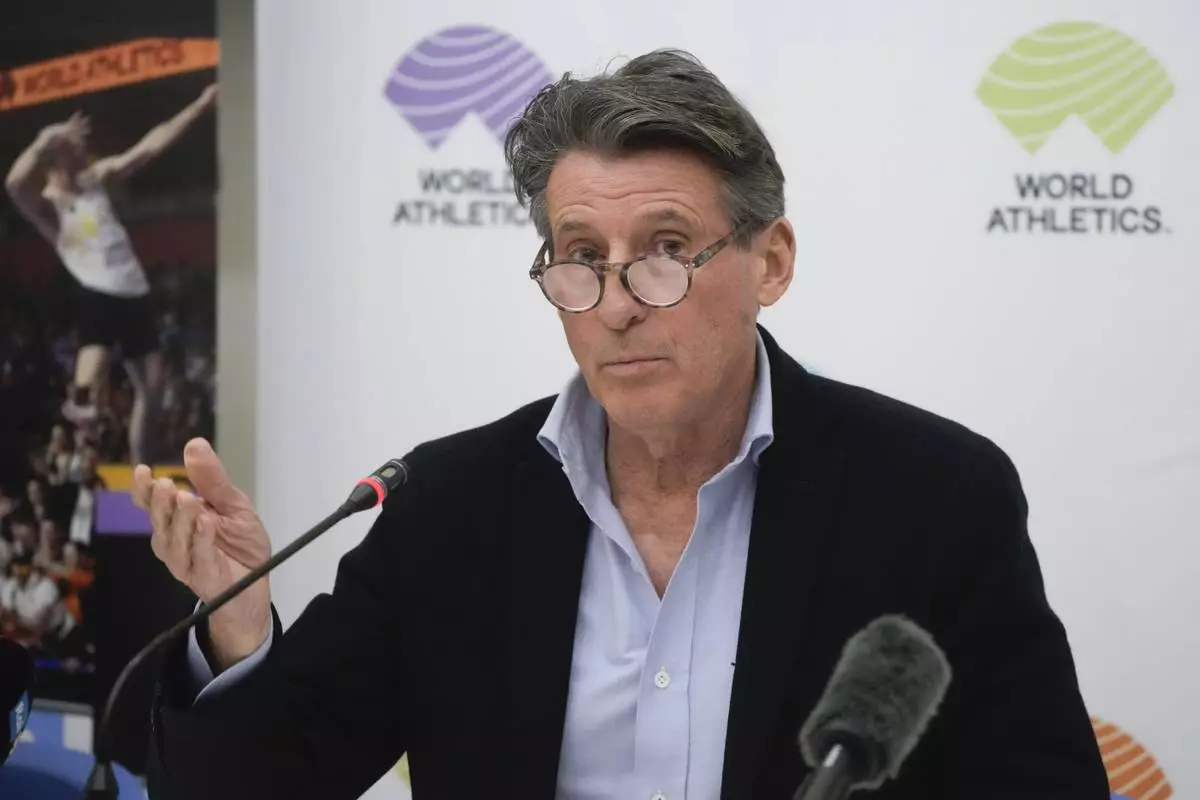
FILE - World Athletics President Sebastian Coe holds a press conference at the conclusion of the World Athletics meeting at the Italian National Olympic Committee, headquarters in Rome, Nov. 30, 2022. (AP Photo/Gregorio Borgia, File)
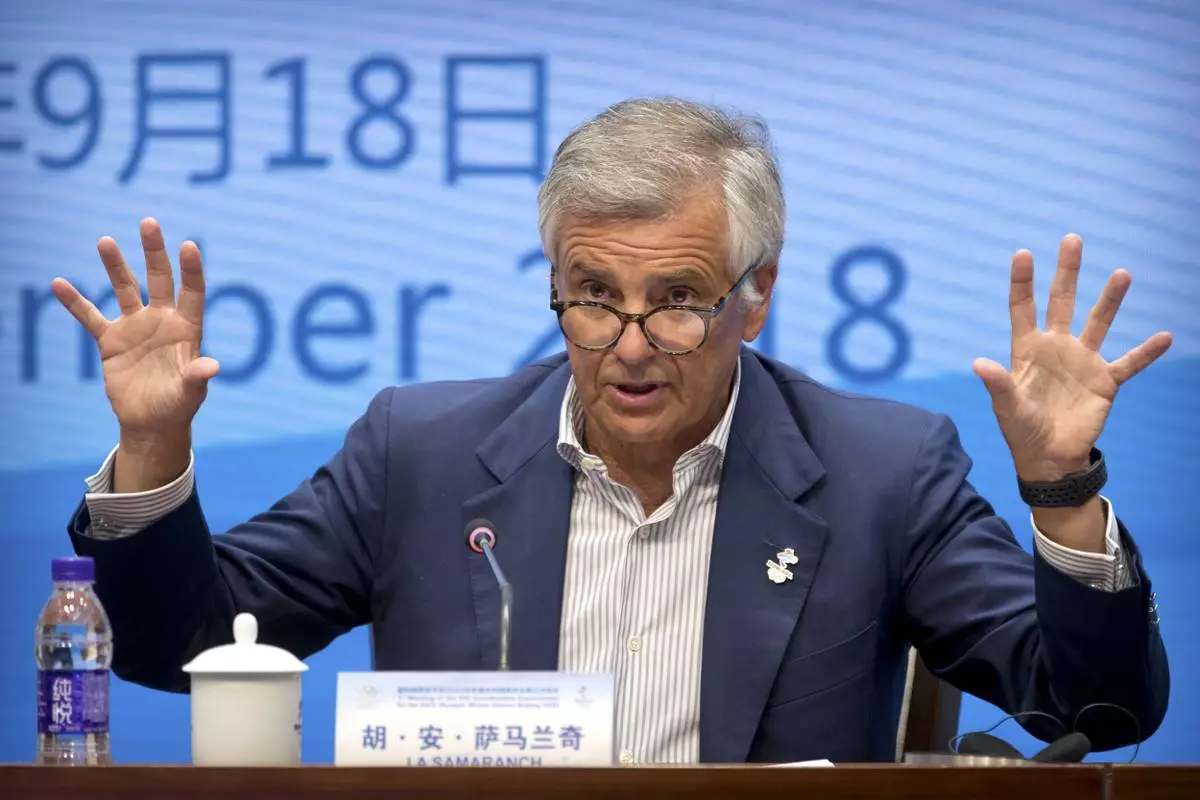
FILE - International Olympic Committee (IOC) Vice President Juan Antonio Samaranch Jr. speaks during a press conference at the headquarters of the 2022 Beijing Winter Olympics Organizing Committee in Beijing, Tuesday, Sept. 18, 2018. (AP Photo/Mark Schiefelbein, File)
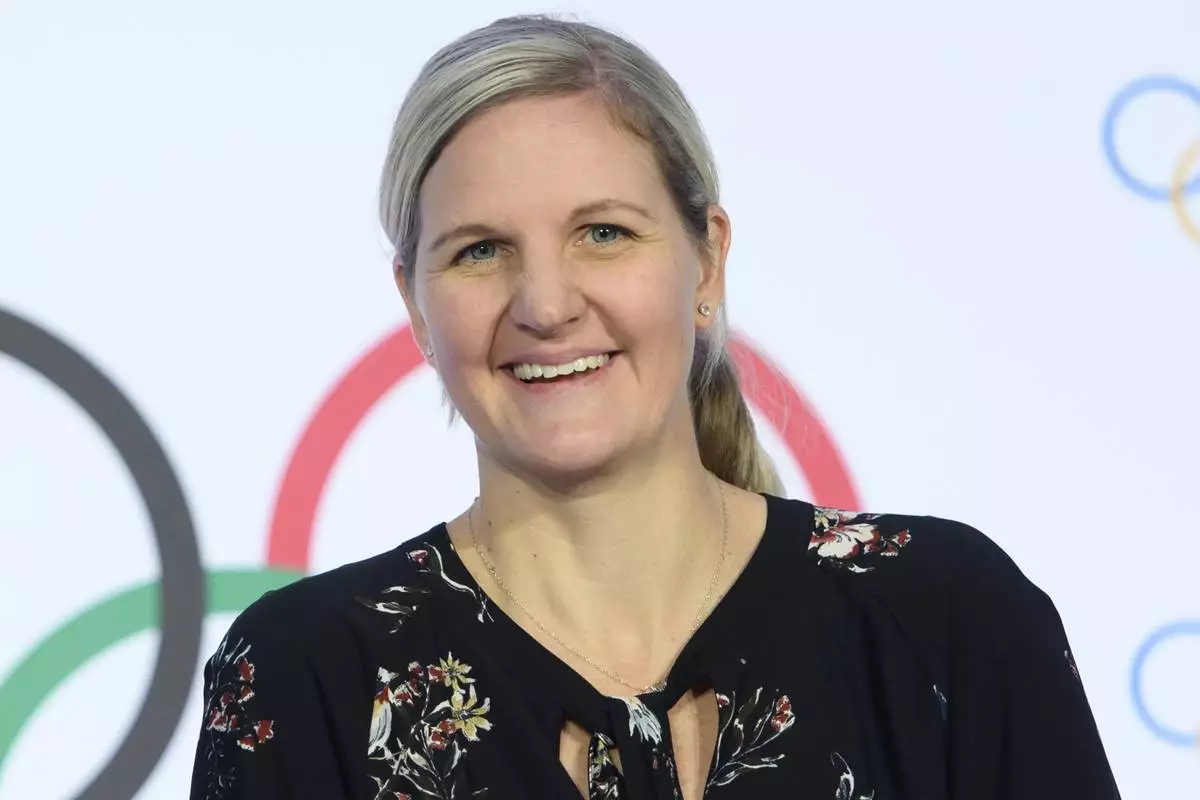
FILE - IOC member and former swimmer Kirsty Coventry smiles on the arrival for a press conference after the executive board meeting of the IOC, at the Olympic House, in Lausanne, Switzerland, Thursday, Jan. 9, 2020. (Laurent Gillieron/Keystone via AP, File)











